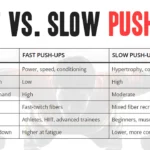Many athletes and fitness enthusiasts try to improve energy, reduce fatigue and to optimize performance through a better diet before training. If you feel drained before training, experience Muscle crampsOr suffer from longer pain, even though it follows a “healthy diet”, your strategy must require attention before training.
Diet before training is a key element of sports performance. Whether they train for perseverance, PerformanceOr sport -specific skills to eat appropriately in advance can significantly improve the energy level, reduce the risk of injury and accelerate recovery.
In this evidence -based guide, we explain how you can customize your nutrition plan before training based on training types, timing and performance goals.
What is the nutrition before training and why it is important?
Diet before training refers to the strategic consumption of nutrients in particular carbohydrates, protein and liquids before training or competition. If you are correctly defined and tailored to the type of activity, this can improve:
- Energy availability and endurance
- Strength and performance
- Focus and cognitive function
- Muscle preservation
- Restoration after training
- Reaction time and decision -making
The International Society for Sports Nutrition (ISSN) Defines the nutrient -timing as the strategic absorption of nutrients in order to positively influence the movement performance and adjustments (Kerksick et al., 2017).
The role of macronutrients in nutrition before training
1. Carbohydrates: Primary fuel for training
Carbohydrates are the most efficient energy source of the body, especially for moderate to high intensity activity. The body stores carbohydrates as glycogen in muscles and liver that is exhausted during training.
General carbohydrate guidelines:
| Timing before training | Carbohydrate recommendation | Example |
|---|---|---|
| 3–4 hours | 3–4 g/kg body weight | Rice with chicken and vegetables |
| 1–2 hours | 1–2 g/kg | Oatmeal with banana and honey |
| <1 hour | 0.5–1 g/kg simple carbohydrates | Banana, sports drink, white bread with jam |
Training -specific adjustments:
- Ultra youth events: 3–4 g/kg
- Endurance sports: 2–3 g/kg
- Strength training: 0.5–2 g/kg
- Activity with low intensity (<45 minutes): Optional, but 20–30 g of carbohydrates can help
Carbohydrates also influence Central fatigueWhich is particularly important in longer or competitive environments in which intellectual sharpness is important.
2. Protein: Not only for training after training
Although often connected to recovery, the protein was consumed before Exercise improves muscle protein synthesis and limits muscle breakdown during longer resistance training.
Recommended protein intake:
- 0.2–0.5 g/kg body weight
- Ideally combined with carbohydrates for increased amino acid intake and muscle protection.
Example of protein sources before training:
- ½ Scoop moly protein in the water
- 1 cup of lean milk
- ½ cup of fat -free Greek yogurt
- 100 g grilled chicken
- 100g tofu or tempeh
Choose slim, low-fat sources to prevent delayed digestion and potential GI pollution.
Moisture before training: the forgotten column
The fluid intake is often overlooked, but can directly influence the performance, thermoregulation, focus and risk of injury.
General guidelines:
- 2–4 hours before training: 5–10 ml/kg body weight
- Goal: Blass yellow urine before training
- Include sodium in snacks before training (e.g. pretzels, soups) to promote water retention
Daily fluid targets:
- Active men: ~ 3 liter/day
- Active women: ~ 2.2 liters/day
The liquid intake includes all liquids (water, tea, milk), but but Water should be the main source.
Diet before training based on the time before training
| Time before training | Carbohydrate recording | Protein absorption | Meals/snack ideas |
|---|---|---|---|
| 3–4 hours | 3–4 g/kg | 30–40 g | Chicken with quinoa, sweet potato, vegetables |
| 1–2 hours | 1–1.5 g/kg | 20–30 g | Bagel with peanut butter + protein smoothie |
| <1 hour | 20–50 g | 10–15 g | Banana + whey protein in the water, rice cake with jam |
Avoid high -fat or fiber meals near the training to reduce the risk of Gi -symptoms like nausea or cramps.
Additional tips before training
- Keep portable carbohydrate sources at hand
Ceriahols, dried fruits, bananas and pretzels are excellent snacks at the last minute. - Practify personalization
Everyone digests the food differently. Try your meals/snacks during training, not On competition days. - Use caffeine carefully
Moderate caffeine (3–6 mg/kg) can improve performance and vigilance, but excessive recording can lead to jitter or GI loads. - Do not only rely on dietary supplements
In most products before training, carbohydrates and protein are missing. Prefewart costs offer a more complete nutrient profile. - Prioritize your general diet
Daily nutritional patterns are more important than every single meal. Ensure balanced, medium -heavy meals of medium -heavy protein all day.
Summary of the general recommendations
| nutrient | Daily goal for active people |
|---|---|
| Carbohydrates | 6–10 g/kg body weight |
| protein | 1.2–2 g/kg body weight |
| Fat | 15–30% of total calories |
| Fluids | 2.2–3.0 liters/day |
At least plan 3 main meals And 2–3 snacks per day that was switched off every 3 to 4 hours to maintain optimal energy and recovery status.
Last thoughts: fuel for success
The nutrition before training can do or break a training session. By understanding and applying the principles of nutrient timing, carbohydrate and protein optimization as well as the proper hydration, you set the stage for high performance and faster recovery.
For the best results you work with A Registered nutritional consultant with a sports nutrition specialty To optimize your plan based on your body composition, your training plan and your performance goals.
References
- Canada dietician. (2016). Nutrition and sporting performance. Journal of the Academy of Nutrition and Nutrition116 (3), 501-528.
- Wildman, R. (2010). Sports and fitness nutrition. Learn Delmar Cengage.
- Kerksick, CM, Arent, S., Schoenfeld, BJ, Stout, JR, Campbell, B., Wilborn, CD,… & Kreider, RB (2017). International Society for Sports Nutritional Position: Nutrient Time. Journal of the International Society for Sports Nutrition14 (1), 33. https://doi.org/10.1186/s12970-017-0189-4





